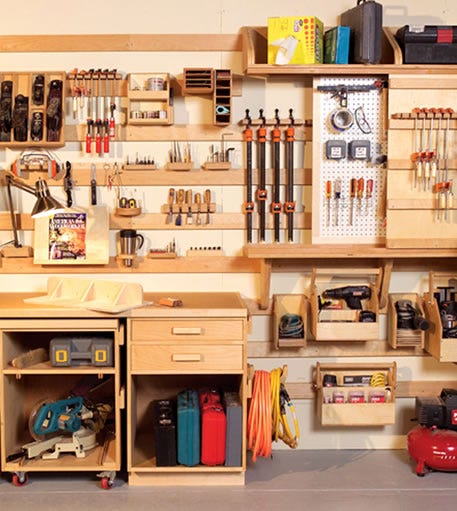Essential Tools for Setting Up a Small Woodworking Workshop

So, you’re dreaming of building your own woodworking haven? That’s awesome! The smell of sawdust, the satisfying thud of a well-placed hammer… it’s pure magic. But before you can start crafting masterpieces, you need the right tools. Setting up a small woodworking workshop can seem daunting, but with a bit of planning and this guide on essential tools for setting up a small woodworking workshop, you’ll be well on your way to creating your own workshop paradise.
The Foundation: Essential Hand Tools
Think of hand tools as your woodworking Swiss Army knife – versatile, indispensable, and the backbone of any workshop, big or small. You don’t need to break the bank here; invest in quality over quantity, and you’ll be rewarded with years of reliable service.
- Measuring & Marking: A good tape measure (at least 25 feet), a combination square, and a marking gauge are absolute must-haves. Accuracy is key in woodworking, so don’t skimp here!
- Sawing: A handsaw (rip and crosscut), a coping saw, and a backsaw are your friends for various cutting needs. Consider a Japanese pull saw for finer work.
- Chiseling: A set of chisels (various sizes) will help you shape, clean up joints, and create decorative details. Start with a few and expand as needed.
- Driving & Striking: A claw hammer (for nailing and pulling nails), a mallet (for hitting chisels and other tools without damaging them), and a rubber mallet (for gentler work) should be part of your kit.
- Clamping: A couple of bar clamps and some quick-release clamps are essential for holding your workpieces securely during assembly.
- Planing: A hand plane (smooth plane or block plane) will help you achieve smooth surfaces and even edges before finishing.
Power Up: Essential Power Tools
While hand tools form the foundation, power tools significantly speed up your work and open up new possibilities. Again, start with the essentials, and gradually add more as your skills and projects grow.
- Circular Saw: A workhorse for ripping and crosscutting lumber. This is probably the single most important power tool for most woodworking projects.
- Jigsaw: Perfect for intricate cuts and curves that a circular saw can’t handle. Think of it as your artistic cutting companion.
- Drill/Driver: A combination drill and driver is a must-have for drilling holes and driving screws. Get one with a variable speed setting for more control.
- Random Orbital Sander: This is your go-to for smoothing surfaces quickly and efficiently. It helps achieve a flawless finish before painting or staining.
- Router (Optional but Highly Recommended): A router expands your capabilities tremendously, allowing you to create decorative edges, dadoes, and rabbets. It’s a significant upgrade but a worthwhile investment.
Safety First: Essential Safety Gear
Woodworking is a rewarding hobby, but it’s essential to prioritize safety. Think of safety gear as your insurance policy, protecting you from potential injuries.
- Safety Glasses: Always wear safety glasses to protect your eyes from flying debris. Consider a face shield for added protection when working with power tools.
- Hearing Protection: Power tools can be quite loud. Earplugs or earmuffs are a must to prevent hearing damage.
- Dust Mask: Wood dust is a serious health hazard. Invest in a good quality dust mask or respirator, especially when sanding or working with hardwoods.
- Work Gloves: Protect your hands from splinters, cuts, and blisters. Choose gloves that are comfortable and allow for good dexterity.
Organizing Your Workshop: Essential Considerations
A well-organized workshop is a safe and efficient workshop. Think of your workspace like a well-oiled machine; everything has its place and is easily accessible. Here are a few key considerations for setting up your workshop:
- Workbenches: Invest in sturdy workbenches that provide ample work surface area and can withstand the rigors of woodworking. Consider a multi-functional workbench with built-in storage.
- Storage Solutions: Shelving units, pegboards, and tool chests can help you organize your tools and keep your workshop clutter-free. A place for everything and everything in its place!
- Dust Collection: A shop vacuum or dust collector will help keep your workspace clean and healthy. It also makes cleanup a breeze.
- Adequate Lighting: Good lighting is crucial for precision and safety. Consider a combination of overhead lighting and task lighting.
Essential Tools for Setting Up a Small Woodworking Workshop: A Recap
Setting up your own woodworking workshop is an exciting journey. Remember, you don’t need to buy everything at once. Start with the essential hand tools, add a few key power tools, and prioritize safety gear. As your skills and projects grow, you can gradually expand your collection. The most important thing is to enjoy the process and create something beautiful. freeslots dinogame
Frequently Asked Questions
- What is the most important tool for a beginner woodworker? A good quality tape measure and a sharp handsaw are essential for accurate cutting and measurement. These form the basis of almost any project.
- How much space do I need for a small woodworking workshop? A space of around 10×10 feet can be sufficient for a small workshop, especially if you’re starting out. The key is efficient space management and organization.
- Where can I find affordable woodworking tools? Check out online retailers, local hardware stores, and used tool marketplaces for deals. Don’t be afraid to shop around and compare prices.
- What type of wood is best for beginners? Softwoods like pine and fir are easier to work with for beginners, as they are less prone to chipping and splitting.
- What are some good woodworking resources for beginners? There are countless online resources, books, and videos available to help you learn woodworking. YouTube channels dedicated to woodworking are a great place to start.

















